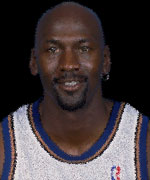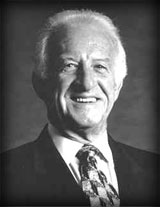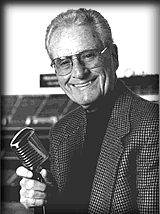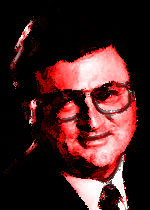
|
||
| Volume II, Issue I | Spring 2003 | |
| Spring 2003 Home Page |
| Culture, Politics & Technology |
| Fiction |
| Music |
| Poetry |
| Theater / Drama |
| About / Contact |
| Archive |
| Current Home Page |

Ephedra and the MLBPA
 In the weeks since the death of Baltimore Orioles' pitcher Steve Bechler (right) during spring training, Major League Baseball has banned the use by minor leaguers of the legal but dangerous stimulant ephedra – which was found during an autopsy to have played a role in Behcler's death.
In the weeks since the death of Baltimore Orioles' pitcher Steve Bechler (right) during spring training, Major League Baseball has banned the use by minor leaguers of the legal but dangerous stimulant ephedra – which was found during an autopsy to have played a role in Behcler's death.
Major League Baseball has been unable to issue a directive to those players with Major League contracts, however, because all such behavior is governed by the collective bargaining agreement.
And Major League Baseball Players Association executive director Donald Fehr has talked as much about players' rights to take ephedra as he has about the dangers of it. The most the Major League Baseball Players Association has done is issue a warning to avoid ephedra – stopping well short of endorsing the commissioner's call for a complete ban.
Fehr doesn't seem to worry so much about the health or lives of the ballplayers he is paid to represent as he does about his own reputation.
Accepting a management-initiated ban on the dangerous drug might make Fehr look weak. Might hurt his reputation.
Or at least what's left of it after this shameful episode ...
Jordan's last run
 As Michael Jordan leads the Washington Wizards through what is surely his last run at the NBA playoffs, here in the Turbula offices on the other side of the country we're hearing an increasing number of comments that it's just time for Jordan to go.
As Michael Jordan leads the Washington Wizards through what is surely his last run at the NBA playoffs, here in the Turbula offices on the other side of the country we're hearing an increasing number of comments that it's just time for Jordan to go.
Most of the complaints make the argument that at age 40, Jordan isn't the player he once was; that it's a shame to see him continue to play with dimished skills.
Others seem to feel that Jordan's continuing to play into his middle years is somehow holding back the next generation of players from reaching their potential.
Both arguments miss the point: As long as Jordan is good enough to compete, why should he be denied the opportunity?
Perhaps he isn't as skilled as he once was; anyone want to argue that he knows less about the game today?
How many players will score 40 points in a game this year? A handful at most – and Jordan, at age 40, was among them. Heck, there are dozens of players in the NBA in their early 20s who can't shoot their own age.
Turbula is tired of the carping – it ought to be enough to sit back and watch one of the game's all-time greats without whining about it ...
The best little sports town in the Midwest
They take their sports seriously in Ohio, as anyone who watched Ohio State's national football championship or the University of Dayton's victory in the Atlantic 10 basketball tourney knows.
In fact, an Ohio town with no major league sports teams now has three of its sportswriters in the Baseball Hall of Fame writer's wing.
 Hal McCoy, who has covered the Cincinnati Reds for the Dayton Daily News since Turbula's editor was delivering the News some 30 years ago to make money to buy baseball cards, was recently selected the winner of this year's J.G. Taylor Spink Award – which confers membership in the Hall of Fame.
Hal McCoy, who has covered the Cincinnati Reds for the Dayton Daily News since Turbula's editor was delivering the News some 30 years ago to make money to buy baseball cards, was recently selected the winner of this year's J.G. Taylor Spink Award – which confers membership in the Hall of Fame.
McCoy joins the late Si Burick and Ritter Collett in the Hall. Burick, like McCoy, wrote for the Daily News; Collett spent most of his career writing for the competing morning Dayton Journal Herald before the papers merged in the 1980s to form the modern Daily News.
Burick and Collett were both better known than McCoy, but they also wrote general sports columns in addition to covering the Reds. Burick was a pal of New York sportswriter Red Smith and San Diego's Jack Murphy – Collett once admitted he always felt like the new kid in Dayton compared to Burick, even after several decades on the job.
But McCoy is their equal as a beat writer, not only covering the Reds as competitively as any of his colleagues at the Cincinnati papers, but treating baseball with respect. Sure, it was McCoy who earned Marge Schott's wrath for his reporting on her peculiar views of race, but he also makes every game story read like a feature. Even in seasons when the Reds have been bad, really bad, the quality of McCoy's writing has reading his stories worthwhile.
Maybe Dayton doesn't have any major league teams. Heck, maybe it isn't even a major league city.
But for whatever reason, three generations of Daytonians have had the pleasure of reading major league sportswriting the equal of that read in any city.
The front row
Perhaps we're a bit more sensitive to the issue, having our corporate headquarters based in San Diego, but here at Turbula we're a bit flummoxed as to Jerry Coleman's inability to get into the Baseball Hall of Fame's broadcasters wing.
 Passed over this year in favor of comedian and play-by-play man Bob Uecker (left), Coleman is one of the great voices in the game. Further, he's a genuine hero – having given up his baseball career twice to fly combat for his country.
Passed over this year in favor of comedian and play-by-play man Bob Uecker (left), Coleman is one of the great voices in the game. Further, he's a genuine hero – having given up his baseball career twice to fly combat for his country.

Now, we're not swayed by the argument that Coleman – an All-Star second baseman for the Yankees – should get more consideration for the Hall than Uecker due to his better playing career. This isn't about selection as a player, and good as Coleman was, he didn't have a Hall of Fame career on the field.
Nor do we think that Uecker is unqualified or doesn't belong in the Hall. To the contrary, Uecker's humor-tinged everyman approach to calling a ballgame is one of the best there is. He is modest, funny and most importantly, knows the game as only an ex-catcher can.
But Coleman (right) is also a treasure – and one we want to make sure those outside San Diego know about. Coleman's long years calling the game of the week on CBS radio have exposed him to nearly as many fans as Uecker's TV network gigs, but radio doesn't always get the same attention.
His famed "Colemanisms" are the stuff of legend – as funny as Uecker's punchlines, if inadvertently so.
But three decades of calling baseball games, including more than two decades for the Padres, have made Coleman one of those voices who are immediately and forever associated with baseball. If not now, then soon, very soon, Jerry Coleman belongs in the Hall ...
Thin-skinned
Padres owner John Moores needs to grow some thicker skin.
 After a student wrote a commentary critical of him in the campus paper, Moores angrily announced he'll no longer have anything to do with San Diego State.
After a student wrote a commentary critical of him in the campus paper, Moores angrily announced he'll no longer have anything to do with San Diego State.
This from the man who almost single-handedly rescued the school's Divison I-A status – donating the funds to build a new football training facility and a top-flight on-campus baseball stadium.
What gives with the overreaction? It only lends credence to the theory that the falling stock market has left Moores with no more money to give – but too much ego to admit as much.
Besides, if you're trying to hurt the student, ignoring him would be the far better approach. You've just turned a 20-something dweeb into a national celebrity – young males live for attention. There's nothing Moores could have done that would have made this student happier.
By reacting in such a childish manner, Moores pulled off the unlikely feat of making the student look mature by comparison ...
![]()
Spring 2003 Culture, Politics & Technology Section | Spring 2003 Main Page
Current Home Page
Copyright © Turbula.net